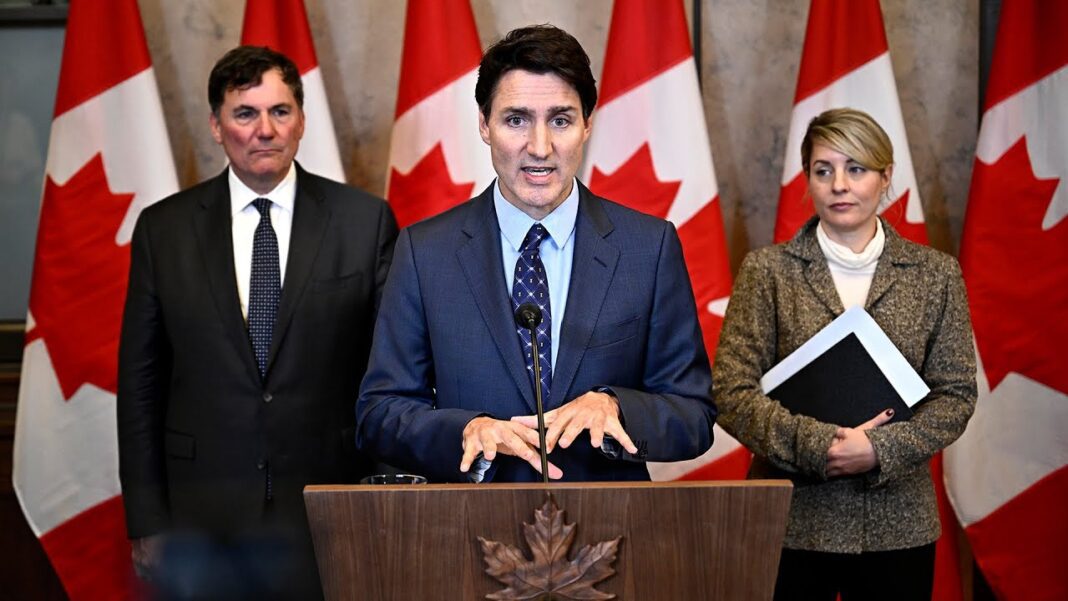Tensions Escalate Between India and Canada
Relations between India and Canada have reached an all-time low after Canadian Prime Minister Justin Trudeau government made serious allegations against Indian diplomats. The accusations claim that Indian agents were involved in the murder of Khalistani terrorist Hardeep Singh Nijjar, who was killed in Canada. In response, India and Canada have expelled each other’s top diplomats. This has lead to a deep diplomatic rift.
Canadian media and political experts have strongly criticized Trudeau for making these allegations without providing credible evidence. Many are questioning whether his actions are driven by political motives rather than genuine concerns about the incident.
Trudeau Criticized for Lack of Evidence
One of the loudest criticisms has come from Canadian media outlets. By including an article published in The National Post by senior journalist John Ivison.
“These are remarkable allegations to make without providing any evidence,” Ivison wrote. He further warned that the Canadian government may be harming its relationship with India, a key global player, without a legitimate reason.
Canada Accused of Allowing Extremism to Grow
John Ivison’s article also highlighted a long-standing issue of Canada allowing Sikh extremism to thrive within its borders. He argued that Trudeau’s government has turned a blind eye to extremist activities among the Khalistani movement, which seeks to create an independent Sikh state. One notable example is the 2023 parade in Toronto that featured a float celebrating the assassination of former Indian Prime Minister Indira Gandhi. This event shocked many, and critics said it showed how Canada has failed to control such extremism.
Ivison believes that Trudeau’s failure to address these issues has worsened Canada’s relations with India. He wrote that the Prime Minister has allowed “diaspora politics to unduly influence foreign policy” by catering to extremist elements in the Sikh community.
Economic Risks of the Diplomatic Standoff
Experts and media outlets are also raising concerns about how the escalating tension between Canada and India. This might impact both countries economically. Daniel Bordman, a Senior Correspondent for The National Telegraph, tweeted that Trudeau’s failure to provide convincing evidence could end up costing Canada “billions in trade.” India is a growing economy and an important trade partner for Canada. This diplomatic fallout could hurt Canada’s economic interests.
Bordman also noted that Trudeau’s decision to pursue this line of action might be politically motivated. He suggested that Trudeau is trying to appease his political ally Jagmeet Singh, leader of the New Democratic Party (NDP), which has strong support from the Sikh community. “All to appease Jagmeet and the gang of Khalistani ministers,” Bordman tweeted, highlighting his belief that Trudeau is prioritizing political alliances over national interest.
Jagmeet Singh Faces Tough Questions
Jagmeet Singh, a key ally of Trudeau and the leader of the NDP, has also come under scrutiny from Canadian media. Singh has been vocal in calling for “severe sanctions” against India but has not provided clear answers on how such actions would affect Canada’s economyDuring a recken. Journalists asked Singh about the possible economic effects of his suggested sanctions. Instead of answering, Singh abruptly ended the press conference, further raising doubts about the strength of the Canadian government’s position on this issue.
No Evidence to Support Canada’s Claims
One of the biggest criticisms facing the Canadian government is its inability to back up its claims with evidence. Since the initial allegations were made in September 2023, Canada has not provided any concrete proof of India’s involvement in Nijjar’s death. Despite this, Trudeau’s government has continued to accuse Indian agents of engaging in “serious criminal activity” in Canada.
India has strongly denied these allegations, calling them part of a “deliberate strategy” by the Canadian government to tarnish India’s image for political gain. Indian officials have also accused Canada of providing a safe space for extremists, including Khalistani terrorists, to operate.
Diplomatic Fallout and Consequences
The diplomatic conflict between India and Canada has already led to the expulsion of diplomats from both sides. The Indian High Commissioner and several other Indian diplomats were identified as “persons of interest” in the RCMP’s investigation into Nijjar’s murder. India responded by expelling a top Canadian diplomat in retaliation.
The ongoing standoff has raised concerns about the long-term impact on India-Canada relations. Both countries have a long history of diplomatic and economic cooperation, and this situation threatens to undermine those ties. Trade relations, in particular, could suffer if the two governments are unable to resolve their differences.
Experts Call for Caution and Diplomacy
As tensions continue to rise, many experts are calling for calm and a more cautious approach. Canadian media has warned that the current strategy could backfire if Trudeau’s government is unable to provide solid evidence to support its claims.
Ivison noted in his article that it is not in Canada’s best interest to be at odds with New Delhi. India is a rising global power, and maintaining a strong relationship with India is important for Canada’s foreign policy and economic stability. By allowing domestic politics to influence foreign policy decisions. Trudeau may be putting Canada’s long-term interests at risk.
A Diplomatic Crisis Without Resolution
The diplomatic crisis between India and Canada shows no signs of easing. With accusations flying and no evidence provided. This situation has created uncertainty for both countries. Canadian media and political experts continue to criticize Prime Minister Trudeau’s handling of the situation. By questioning the wisdom of escalating tensions without a clear strategy. The relationship between India and Canada hangs in the balance, with no clear resolution in sight.

